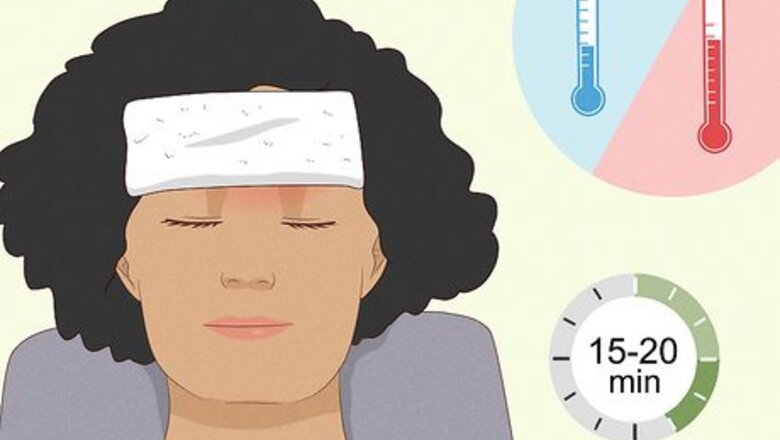
views
X
Trustworthy Source
Cleveland Clinic
Educational website from one of the world's leading hospitals
Go to source
Here, we've collected some of the best ways to relieve headaches without medication, along with some ways to prevent them before they start.
Apply heat or ice to your forehead.
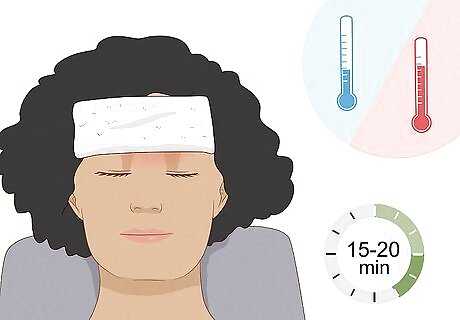
Either a warm compress or an ice pack can help relieve a headache. For a warm compress, use a heating pad on low or soak a washcloth in warm water and wring it out thoroughly. For cold, use an ice pack or a bag of frozen vegetables wrapped in a towel. Put either on your forehead for 15-20 minutes. Which one you use is really a matter of personal preference. Both can work, but some work better for some people than others. Heat tends to work better for a sinus headache because it helps loosen up congestion.
Relax with a bath or shower.
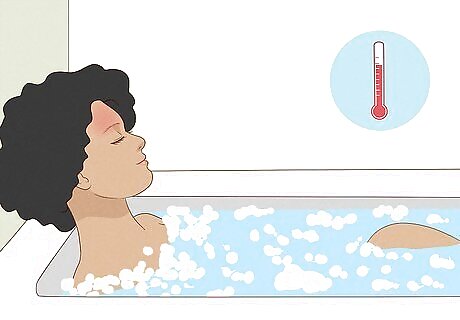
A warm bath or shower can work the same way as a heating pad. Warmth calms your mind and eases tension in your muscles, which can help relieve a headache. Taking time out for self-care also helps you let go of the stresses of the day, which might help make your headache go away. Use a bubble bath or shower gel with a calming scent, such as lavender, to compound the effect.
Take a nap to release tension.
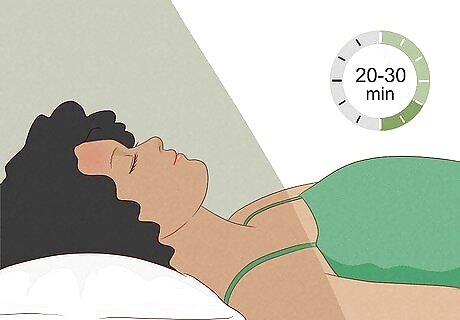
Find a quiet, dark spot and lie down on a soft surface. Close your eyes and focus on letting go of all the tension in your body—specifically in your shoulders, neck, and back. Turn your attention to your breath and consciously breathe in and out deeply until you drift off into a comfortable sleep. When you wake up, you might find that your headache has miraculously disappeared! However, if you have limited time, be sure to set an alarm so you don't miss anything important. Keep your nap short! Naps longer than 20-30 minutes can interfere with your nighttime sleep and cause more headaches.
Relieve built-up muscle tension with massage.
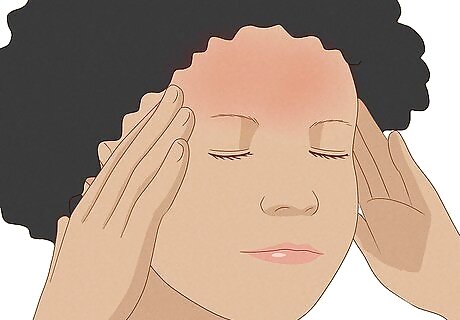
Gently rub your temples, scalp, neck, and shoulders with your fingertips. Apply a little more pressure if you feel a tight spot. Gently stretching your neck can also help. Studies show regular massage therapy can reduce the frequency of tension headaches. But even if regular sessions with a massage therapist aren't available for you, self-massage can still be extremely beneficial.
Take a break from electronics to rest your eyes.
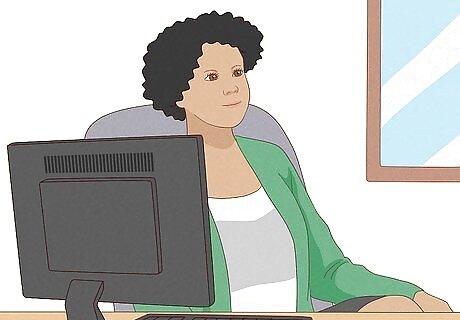
Every 20 minutes stare at something 20 feet away for 20 seconds. This helps reduce eye strain from looking at screens, which can cause headaches. If you feel a headache coming on and you're currently staring at a computer screen, closing your eyes for a minute might also give you some relief. If you get in the habit of taking regular breaks, especially if you have to look at screens a lot for work or school, you'll likely find you get fewer headaches. Look into glasses to reduce glare from screens if eye strain headaches are an issue for you.
Drink water to prevent dehydration.
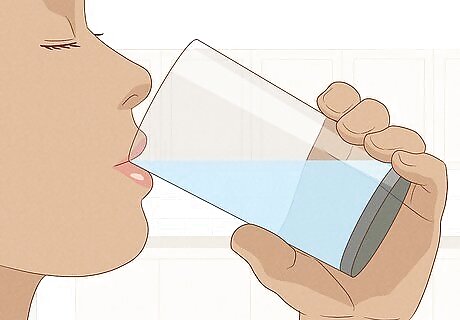
At least 8 glasses of water a day can prevent dehydration headaches. The specific amount of water you should drink each day depends on your sex, age, height, weight, and activity level. If you're exercising or sweating a lot, drink more water to help your body recover the fluids it's lost. Generally, you can tell that you're properly hydrated if you're rarely thirsty and your urine is clear or pale yellow in color. This works as a more immediate cure as well as a preventive measure if your headache was caused by dehydration.
Exercise regularly to help prevent headaches.
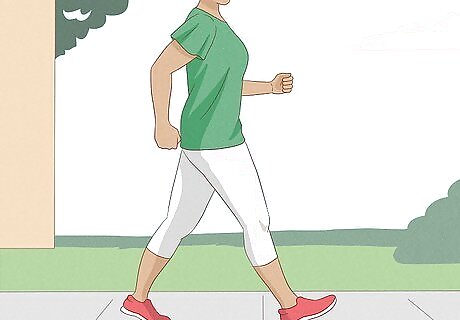
Get some cardio exercise most days of the week. Something as simple as a brisk walk for 20-30 minutes improves your cardiovascular fitness and helps keep headaches at bay. One study even found that regular exercise (in combination with relaxation practice) was as effective as a prescription drug at reducing the rate of migraines! You can also use exercise to treat headaches. Even though working out might be the last thing you want to do when your head is pounding, a brisk walk might help. Studies have shown that aerobic exercise can help lessen the intensity of pain and regular exercise can help reduce the frequency of headaches.
Maintain good posture to reduce tension.
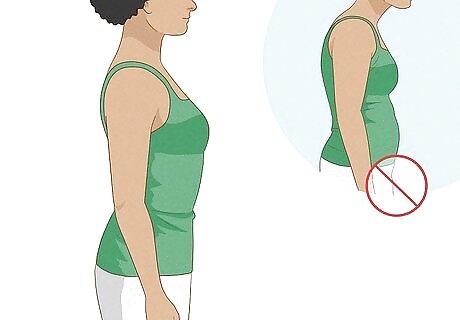
Sit or stand with your shoulders back and your head level. Slumping or hunching over strains the muscles in your neck and shoulders and can lead to headaches. Check your posture regularly, especially if you're sitting for a while in the same position. If you find yourself hunching your shoulders, simply roll them back and lower them to correct your posture. If you're used to slouching, it can take some time to get in the habit of sitting and standing with good posture, but you'll start noticing benefits almost immediately.
Try relaxation techniques to reduce stress.
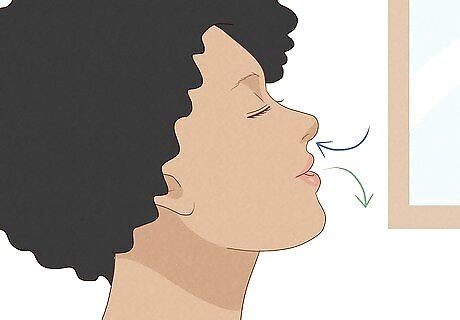
Deep breathing exercises and meditation help deal with the daily grind. Stress is one of the biggest causes of tension headaches. Whenever you start to feel stressed, taking a minute or two to focus on your breath helps you calm down and cope. If you want to start a regular meditation practice, you don't have to do it alone—there are plenty of smartphone apps you can choose from to get started. Many of them are free to use, although some require a monthly subscription to unlock all the features.
Stave off hunger headaches with regular meals.
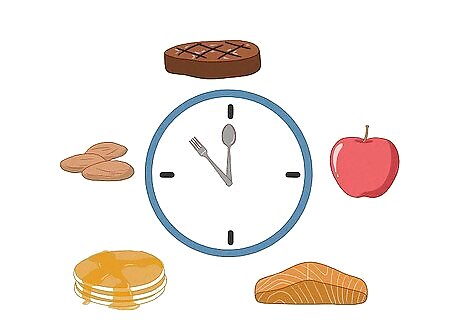
Eating 3 meals a day along with small snacks helps prevent headaches. Include a good, clean protein source (such as milk, meat, or fish) to keep from getting hungry between meals. You might also want to keep a food diary so you can figure out if you have any food sensitivities. It can take several days for a reaction to develop, which makes it difficult to pinpoint your exact sensitivities—but a food diary can help! For example, you might notice that you get a headache the day after eating beef. You might want to avoid beef for a few weeks to see if the headaches go away or decrease.
Follow a consistent sleep schedule.
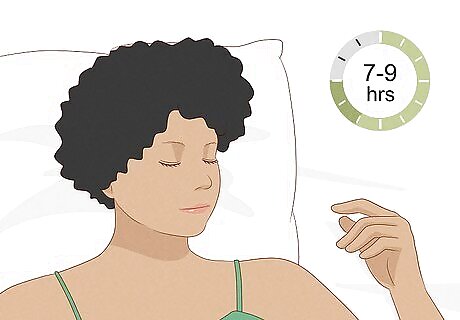
Not getting enough sleep can cause headaches, especially in the morning. Most adults need at least 7-8 hours of sleep and perform their best when they go to sleep and wake up at roughly the same time every day. If your sleep schedule is erratic, setting a regular bedtime might help. Creating a bedtime routine can also help. Turn down the lights about an hour before you go to bed and avoid screens (computers, phones, TVs) for a half-hour or so before bedtime. Taking a warm bath can also help calm your body and get you ready for sleep.
Avoid headache triggers.
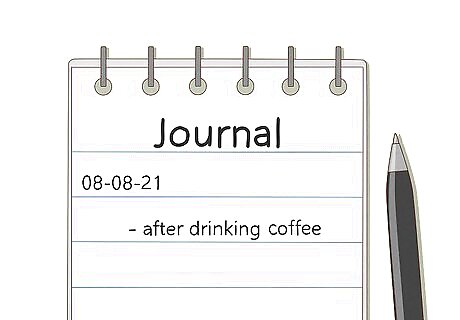
Keep a headache diary to identify possible triggers. If you get headaches on a regular basis, write down the date and time along with what you were doing when the headache came on as well as immediately before. Over time, you'll likely see patterns so you'll know what to avoid. While some things are considered common headache triggers, different things can be triggering for different people. For example, if you're used to drinking a cup of coffee (or two) every morning, not getting your usual cup of Joe could trigger a headache. At the same time, caffeine can cause headaches in people who are sensitive to it. Understanding your triggers helps you not only prevent headaches but also find the best way to treat them when they come.
Try a nutritional supplement to prevent headaches.
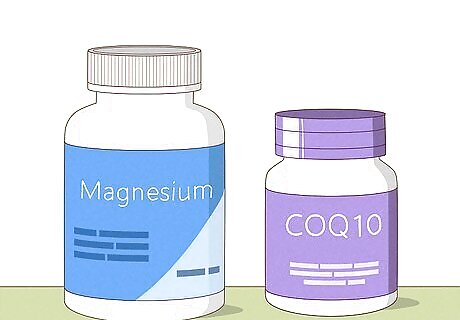
Vitamins and minerals can prevent headaches if taken regularly. You might get a headache because you're deficient in a particular vitamin or mineral (this is often the case with B vitamins). Others actively prevent headaches from happening. Here are some to try: Coenzyme Q10: may reduce the frequency of headaches and migraines Melatonin: helps improve sleep quality and may decrease headaches, especially morning headaches Magnesium: when taken daily, may help reduce the frequency of headaches and migraines B vitamins (also found in leafy greens, beans, nuts, and seeds): B2 (riboflavin), in particular, helps reduce the frequency of headaches Although some studies support the use of supplements for headaches, more research needs to be done to determine whether it is effective.
Try an herbal remedy to relieve tension.
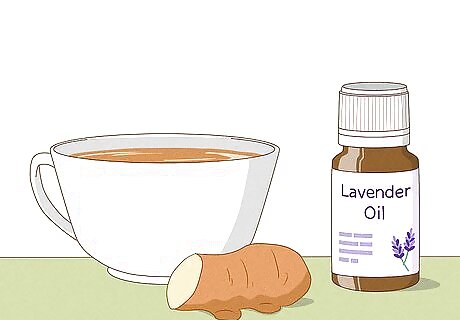
Drinking an herbal tea or taking a supplement might ease your pain. Herbal remedies don't work for everyone, but they're worth trying out. If you don't like a particular flavor, take a supplement in caplet form instead (you can find these online or at some pharmacies or health food stores). The supplement might take longer to work than if you drink the herb straight in tea form. Here are some to try: Feverfew (standard dose 50-100 mg daily): reduces inflammation of blood vessels in your head—great for sinus headaches and congestion Ginger (tea or candy, 1/4 teaspoon of ground ginger in hot water): decreases headache severity, may relieve nausea that often accompanies a migraine headache Lavender (2-4 drops of oil in water): soothes pain and boosts mood Peppermint (tea or 2-4 drops of oil): soothes pain; has a cooling effect Although some studies support the use of supplements for headaches, more research needs to be done to determine whether it is effective.










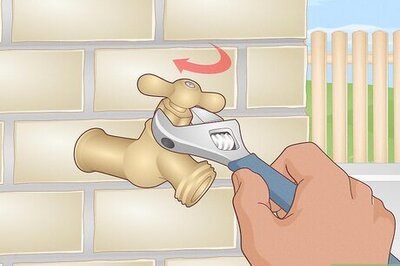





Comments
0 comment